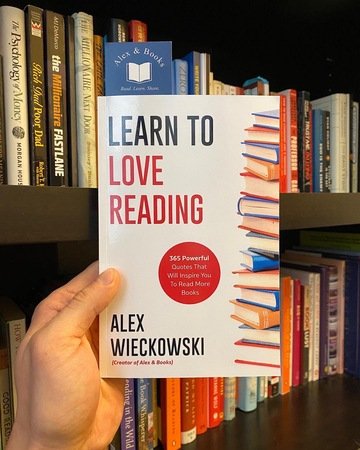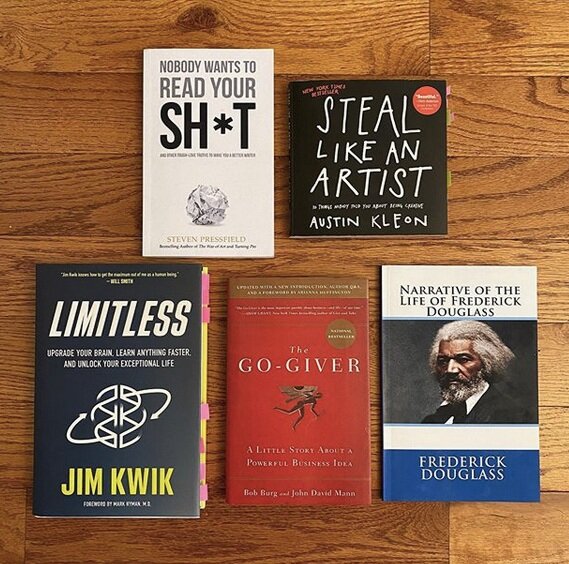I recently finished reading 100 Books That Changed the World by Scott Christianson and Colin Salter. It’s a beautifully illustrated book that informs and entertains readers about 100 books that shaped, changed, and even revolutionized the world.
The book includes scriptures that founded religions, manifestos that sparked revolutions, scientific treatises that challenged ingrained beliefs, and novels that kick-started new literary movements.
Reading this book is similar to having a time machine as you travel around the globe through time from the I Chang written in 2800 BC to modern-day books such as Harry Potter and This Changes Everything.
This is an excellent book for literature lovers, history buffs, or anyone who wants a fascinating coffee table book that will get your guests talking about books.
Here are the 100 books and a short description of each. Enjoy!
1) I Ching (2800 BC)
2) The Epic of Gilgamesh (2100 BC)
A 4,000-year-old tale that is the oldest work of literature ever recorded and shares classic themes such as friendship, a voyage of self-discovery, and a pursuit for eternal life.
3) Torah (1280 BC)
4) The Iliad and The Odyssey by Homer (750 BC)
5) Aesop’s Fables (620 BC)
One of the earliest and greatest collections of fables ever written, it includes classic stories such as: The Wolf in Sheep’s Clothing, The Goose that Laid the Golden Egg, and The Boy Who Cried Wolf.
6) The Art of War by Sun Tzu (512 BC)
7) The Analects of Confucius (475 BC)
A collection of ancient sayings that offer ethical principles to regulate the 5 relationships of life: the relationships of prince and subject, parent and child, brother and brother, husband and wife, and friend and friend.
8) Kama Sutra by Vatsyayana (400 BC)
9) The Republic by Plato (380 BC)
10) Elements of Geometry by Euclid (300 BC)
11) De Architectura by Vitruvius (20 BC)
12) Naturalis Historia by Pliny the Elder (AD 79)
13) The Quran (609)
14) Arabian Nights (800)
15) The Tale of Genji by Murasaki Shikibu (1021)
16) The Divine Comedy by Dante (1308)
The greatest literary creation of the Middle Ages. It envisions a trip through Hell, Purgatory, and Heaven, guided by the Roman poet Virgil.
17) The Canterbury Tales by Geoffrey Chaucer (1390)
18) Gutenberg Bible (1450)
19) The Prince by Machiavelli (1532)
20) On the Revolutions of the Heavenly Spheres by Nicolaus Copernicus (1543)
21) Lives of the Artists by Vasari (1550)
22) The Prophecies by Nostradamus (1557)
23) Don Quixote by Cervantes (1605)
24) King James Bible (1611)
25) Shakespeare’s First Folio by William Shakespeare (1623)
Published seven years after his death, this book contained some of Shakespeare’s most iconic works including Julius Caesar, Macbeth, Henry VI, and many more.
26) Micrographia by Robert Hooke (1665)
27) Paradise Lost by John Milton (1667)
28) Samuel Pepys’s Diary by Samuel Pepys (1669)
29) Philosophiae Naturalis Principia Mathematic by Isaac Newton (1687)
30) Gulliver’s Travels by Jonathan Swift (1726)
31) Species Plantarum by Carl Linnaeus (1753)
32) Samuel Johnson’s Dictionary by Samuel Johnson (1755)
33) The Castle of Otranto by Horace Walpole (1764)
34) The History of the Decline and Fall of the Roman Empire by Edward Gibbon (1766)
35) The Wealth of Nations by Adam Smith (1776)
36) Rights of Man by Thomas Paine (1791)
37) A Vindication of the Rights of Woman by Mary Wollstonecraft (1792)
38) Grimm’s Fairy Tales by Jacob & Wilhelm Grimm (1812)
39) Pride and Prejudice by Jane Austen (1813)
40) Frankenstein by Mary Shelley (1818)
A classic Gothic horror novel that discusses nature, responsibility, isolation, and the dangers of using powerful knowledge.
41) Procedure for Writing Words, Music and Plainsong in Dots by Louis Braille (1829)
42) Murray’s Handbook for Travellers by John Murray (1836)
43) The Pencil of Nature by William Talbot (1844)
44) Narrative of the Life of Frederick Douglass by Frederick Douglass (1845)
Born a slave, Douglass taught himself how to read and write, later escaped to the North where he wrote a memoir about his life which became one of the most important tracts of the antislavery movement.
45) Jane Eyre by Charlotte Bronte (1847)
A vivid story of love, belonging, and class, this far-from-smooth course of true love tale rings true for each new generation that reads it.
46) David Copperfield by Charles Dickens (1850)
47) Moby-Dick by Herman Melville (1851)
An epic tale about a captain’s pursuit of a ferocious white whale, the book shares deep lessons about social status, good and evil, and the existence of God.
48) Roget’s Thesaurus by Peter Roget (1852)
49) Walden by Henry Thoreau (1854)
After spending two years in the wilderness and reflecting on life, Thoreau shares the lessons he learned about the environment, religion, politics, and philosophy in this book.
50) Madame Bovary by Gustave Flaubert (1857)
51) Gray’s Anatomy by Henry Gray & Henry Carter (1858)
52) On the Origin of Species by Charles Darwin (1859)
53) Mrs. Beeton’s Book of Household Management by Isabella Beeton (1861)
A bestselling book that was designed to improve the home lives of women by providing cooking recipes, first aid, social etiquette, and more helpful advice.
54) Les Miserables by Victor Hugo (1862)
55) Journey to the Center of the Earth by Jules Verne (1864)
56) Alice’s Adventures in Wonderland by Lewis Carroll (1865)
57) Crime and Punishment by Fyodor Dostoyevsky (1867)
58) Das Kapital by Karl Marx (1867)
59) War and Peace by Leo Tolstoy (1869)
60) The Adventures of Huckleberry Finn by Mark Twain (1884)
61) The Picture of Dorian Gray by Oscar Wilde (1891)
62) The Time Machine by H.G. Wells (1895)
63) The Interpretation of Dreams by Sigmund Freud (1899)
64) Remembrance of Things Past by Marcel Proust (1913)
65) The Origin of Continents and Oceans by Alfred Wegener (1915)
66) Relativity: The Special and General Theory by Albert Einstein (1917)
67) Ulysses by James Joyce (1922)
Modeled on Homer’s epi,c Ulysses is regarded as one of the richest books ever written. It’s filled with tragicomedy, puns, parodies and literary allusions, all of which add up to a passionate affirmation of life.
68) The Trial by Franz Kafka (1925)
69) The Tibetan Book of the Dead by Walter Evans-Wentz (1927)
70) Lady Chatterley’s Love by D.H. Lawrence (1928)
71) All Quiet on the Western Front by Erich Remarque (1929)
72) The General Theory of Employment, Interest and Money by John Keynes (1936)
73) How to Win Friends and Influence People by Dale Carnegie (1936)
74) Dr. Spock’s Baby and Child Care by Benjamin Spock (1946)
75) The Diary of a Young Girl by Anne Frank (1947)
76) Kinsey Reports by Alfred Kinsey (1948)
77) 1984 by George Orwell (1949)
78) The Second Sex by Simone de Beauvoir (1949)
79) A Book of Mediterranean Food by Elizabeth David (1950)
A book about food, fresh ingredients, and seasonal flavors, written in such beautiful prose that is was borderline poetic.
80) The Doors of Perception by Aldous Huxley (1954)
81) Lolita by Vladimir Nabokov (1955)
82) The Lord of the Rings by J.R.R. Tolkien (1955)
83) On the Road by Jack Kerouac (1957)
84) The Cat in the Hat by Dr. Seuss (1957)
85) Things Fall Apart by Chinua Achebe (1958)
86) To Kill a Mockingbird by Harper Lee (1960)
87) Silent Spring by Rachel Carson (1962)
88) One day in the Life of Ivan Denisovich by Alexander Solzhenitsyn (1962)
The first-ever book that publicly acknowledged the existence of the Soviet gulags. Solzhenitsyn based the book on his experience in a forced labor camp. Attempts were made to discredit Solzhenitsyn, and even poison him, but he survived and awarded the Nobel Prize for Literature in 1970 for his book.
89) The Feminine Mystique by Betty Friedan (1963)
90) Quotations from Chairman Mao Tse-tung by Mao Tse-tung (1964)
91) One Hundred Years of Solitude by Gabriel Garcia Marquez (1967)
92) I Know Why the Caged Bird Sings by Maya Angelou (1969)
93) Ways of Seeing by John Berger (1972)
94) Zen and the Art of Motorcycle Maintenance by Robert Pirsig (1974)
95) A Brief History of Time by Stephen Hawking (1988)
96) The Satanic Verses by Salman Rushdie (1988)
97) Maus by Art Spiegelman (1991)
98) Harry Potter and the Philosopher’s Stone by J.K. Rowling (1997)
99) Capital in the Twenty-First Century by Thomas Piketty (2013)
100) This Changes Everything: Capitalism vs. the Climate by Naomi Klein (2014)




















